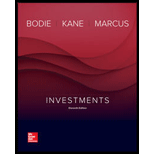
(A)
To choose:
The bond that will provide higher
Introduction:
Interest rate change will have greater effect on long term bonds having longer duration as compared to short term bonds. So a bond with longer duration will have higher gain on bonds.
(B)
To choose:
The bond that will provide higher capital gains.
Introduction:
Interest rate change will have greater effect on long term bonds having longer duration as compared to short term bonds. So a bond with longer duration will have higher gain on bonds.
(C)
To choose:
The bond that will provide higher capital gains.
Introduction:
Interest rate change will have greater effect on long term bonds having longer duration as compared to short term bonds. So a bond with longer duration will have higher gain on bonds.
Want to see the full answer?
Check out a sample textbook solution
Chapter 16 Solutions
Investments
- finance subjectarrow_forwardCould you help explain, what is the complete salary survey analysis, and ensuring the data is relevant and up-to-date? What is the job evaluation and compensation plan? How to ensure the final report is comprehensive, clearly structured, and aligned with the company vision?arrow_forwardThe maturity value of an $35,000 non-interest-bearing, simple discount 4%, 120-day note is:arrow_forward
- Carl Sonntag wanted to compare what proceeds he would receive with a simple interest note versus a simple discount note. Both had the same terms: $18,905 at 10% for 4 years. Use ordinary interest as needed. Calculate the simple interest note proceeds. Calculate the simple discount note proceeds.arrow_forwardWhat you're solving for Solving for maturity value, discount period, bank discount, and proceeds of a note. What's given in the problem Face value: $55300 Rate of interest: 10% Length of note: 95 days Date of note: August 23rd Date note discounted: September 18th Bank discount rate:9 percentarrow_forwardAll tutor giving incorrect solnarrow_forward
 Intermediate Financial Management (MindTap Course...FinanceISBN:9781337395083Author:Eugene F. Brigham, Phillip R. DavesPublisher:Cengage Learning
Intermediate Financial Management (MindTap Course...FinanceISBN:9781337395083Author:Eugene F. Brigham, Phillip R. DavesPublisher:Cengage Learning

